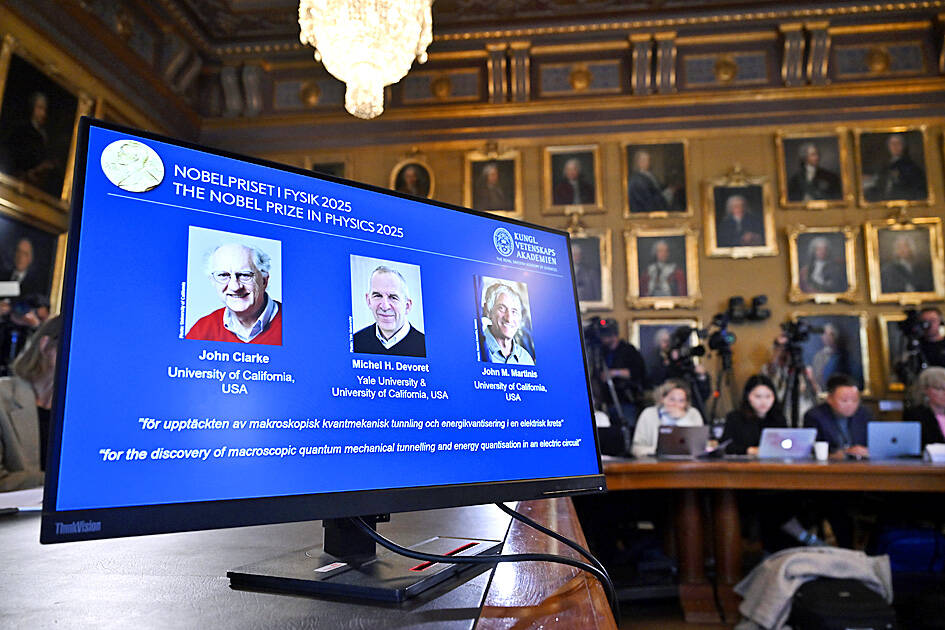Briton John Clarke, Frenchman Michel Devoret and American John Martinis yesterday won the Nobel Prize in Physics for work on quantum physics in action, the Nobel jury said.
The trio was honored “for the discovery of macroscopic quantum mechanical tunneling and energy quantization in an electric circuit,” the jury said.
Quantum mechanics describes how differently things work on incredibly small scales. For example, when a normal ball hits a wall, it bounces back, but on the quantum scale, a particle will actually pass straight through a comparable wall — a phenomenon called “tunneling.”

Photo: EPA
The prize was awarded for experiments in the 1980s which showed that quantum tunneling can also be observed on a macroscopic scale — involving multiple particles — by using superconductors.
In a series of experiments, the researchers demonstrated that “the bizarre properties of the quantum world can be made concrete in a system big enough to be held in the hand,” the Royal Swedish Academy of Sciences said in a statement.
“This prize is awarding an experiment that brings the scale up to the macroscopic scale, scales that we can understand and measure through human standards,” said Ulf Danielsson, secretary of the Nobel Committee for Physics and a professor of theoretical physics at Uppsala University.
The discoveries had “provided opportunities for developing the next generation of quantum technology, including quantum cryptography, quantum computers and quantum sensors,” the jury said.
“It is wonderful to be able to celebrate the way that century-old quantum mechanics continually offers new surprises,” Olle Eriksson, chair of the Nobel Committee for Physics, said in a statement. “It is also enormously useful, as quantum mechanics is the foundation of all digital technology.”
Clarke, 83, is a professor at the University of California, Berkeley.
Devoret, 72, is a professor at University of California, Santa Barbara, and is listed as a professor emeritus at Yale University.
Martinis, born 1958, is also a professor at the University of California, Santa Barbara.
“To put it mildly, it was the surprise of my life,” Clarke told reporters via telephone during the prize announcement, about learning of his award.
“It never occurred to me in any way that this might be the basis of a Nobel prize,” he added.
Clarke said that the scientists had been focused on the physics of their experiments and had not realized at the time the practical applications that could follow.
“It certainly had not occurred to us in any way that this discovery would have such a significant impact,” he said.
Asked how their discoveries had affected everyday life, Clarke noted that he was speaking to the audience via his mobile phone.
“One of the underlying reasons that the cellphone works is because of all this work,” Clarke said.
Martinis’ wife, Jean, told Associated Press reporters who called at his home about two-and-a-half hours after the announcement that he was still asleep and did not yet know.
She said in the past they had stayed up on the night of the physics award, but at some point they decided that sleep was more important.
“He doesn’t like surprises,” she said.
Devoret could not immediately be contacted.
Additional reporting by AP

A Ministry of Foreign Affairs official yesterday said that a delegation that visited China for an APEC meeting did not receive any kind of treatment that downgraded Taiwan’s sovereignty. Department of International Organizations Director-General Jonathan Sun (孫儉元) said that he and a group of ministry officials visited Shenzhen, China, to attend the APEC Informal Senior Officials’ Meeting last month. The trip went “smoothly and safely” for all Taiwanese delegates, as the Chinese side arranged the trip in accordance with long-standing practices, Sun said at the ministry’s weekly briefing. The Taiwanese group did not encounter any political suppression, he said. Sun made the remarks when

The Taiwanese passport ranked 33rd in a global listing of passports by convenience this month, rising three places from last month’s ranking, but matching its position in January last year. The Henley Passport Index, an international ranking of passports by the number of designations its holder can travel to without a visa, showed that the Taiwan passport enables holders to travel to 139 countries and territories without a visa. Singapore’s passport was ranked the most powerful with visa-free access to 192 destinations out of 227, according to the index published on Tuesday by UK-based migration investment consultancy firm Henley and Partners. Japan’s and

BROAD AGREEMENT: The two are nearing a trade deal to reduce Taiwan’s tariff to 15% and a commitment for TSMC to build five more fabs, a ‘New York Times’ report said Taiwan and the US have reached a broad consensus on a trade deal, the Executive Yuan’s Office of Trade Negotiations said yesterday, after a report said that Washington is set to reduce Taiwan’s tariff rate to 15 percent. The New York Times on Monday reported that the two nations are nearing a trade deal to reduce Taiwan’s tariff rate to 15 percent and commit Taiwan Semiconductor Manufacturing Co (TSMC, 台積電) to building at least five more facilities in the US. “The agreement, which has been under negotiation for months, is being legally scrubbed and could be announced this month,” the paper said,

Japan and the Philippines yesterday signed a defense pact that would allow the tax-free provision of ammunition, fuel, food and other necessities when their forces stage joint training to boost deterrence against China’s growing aggression in the region and to bolster their preparation for natural disasters. Japan has faced increasing political, trade and security tensions with China, which was angered by Japanese Prime Minister Sanae Takaichi’s remark that a Chinese attack on Taiwan would be a survival-threatening situation for Japan, triggering a military response. Japan and the Philippines have also had separate territorial conflicts with Beijing in the East and South China